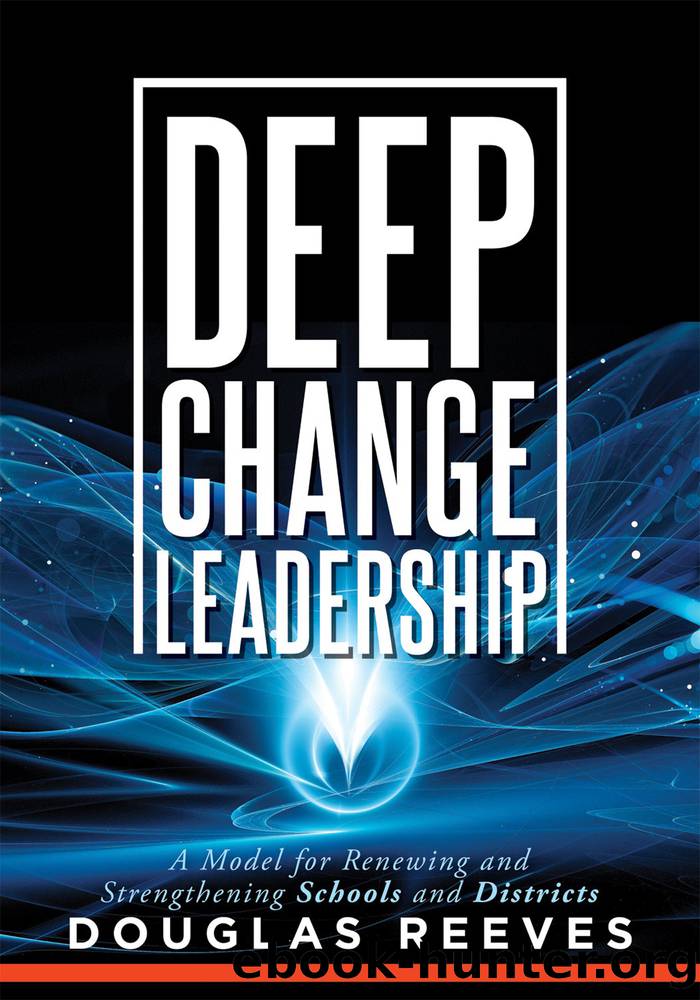Deep Change Leadership by Reeves Douglas;

Author:Reeves, Douglas;
Language: eng
Format: epub
Publisher: Solution Tree
Published: 2021-08-15T00:00:00+00:00
CONSTRUCTIVE ANGER
The meaning of our lives can sometimes be measured in what makes us angry. Petty people get angry about petty thingsâinattentive drivers and pedestrians, inconsiderate shoppers, slow service in restaurants, and a host of other irritants that most people find annoying but that lead others into deep paroxysms of rage. Serious people reserve their anger for serious things, such as injustice, threats to children, and violations of values, to name a few. Change leaders in particular reserve their anger for things they want to change, while ineffective leaders direct their anger at things that cannot be changed. Psychologist Marcia Reynolds (2011) notes that the things we wish to change, from personal habits to organizational culture, did not come to be by accident. Teaching and leadership practices that we now wish to change were the result not of carelessness but of deliberation. While it may seem obvious to some that hour-long lectures without checks for understanding are ineffective pedagogy in 2021, the purveyors of those lectures deliver them not out of malice or laziness but because that very method of instruction worked well for them as students. The leaders who bring lofty but vacuous inspirational quotes to faculty meetings are not dunces; they are replicating the leaders they have admired. Every behavior is deliberate, established because it provides comfort, convenience, and some sort of pleasure. This is even true of addictive behaviors that, however destructive, began with deliberate choices that relieved some sort of discomfort. Reynolds (2011) argues that in order for change to take place, our level of anger must exceed the level of comfort, convenience, and pleasure provided by the factors we wish to change. In sum, itâs not enough to provide a cost-benefit analysis to generate deep change. We need a change in perspective that will make us sufficiently uncomfortable, even angry, to change our ingrained patterns of behavior. The late Grant Wiggins gave me one of the best examples of this (Reeves, 2016).
Wigginsâs daughter, Alexis, was a veteran instructional coach in a very high-performing school and shadowed a student for two days. The context was that teachers were elite professionals, at the top of their game, and the high performance of their students validated their success. And in this context, there would seem to be little reason to change. Yet a mere two days of walking in the footsteps of students demonstrated to Alexis, among other things, that students were leading lives of crushing boredom, sullenly complying with teachersâ demands, and not nearly as engaged as the faculty and administration thought (Reeves, 2016). If you want to engender constructive anger among faculty and administrators that will lead them to imagine a better future for a school or district, ask them to replicate this exercise; studentsâ perspectives are dramatically different from what an observerâalways standing rather than sitting at an uncomfortable deskâmight see and feel.
There are, however, extensive social inhibitions to anger, and this is particularly true of women in leadership positions. Men who express anger are
Download
This site does not store any files on its server. We only index and link to content provided by other sites. Please contact the content providers to delete copyright contents if any and email us, we'll remove relevant links or contents immediately.
Figuring Out Fluency in Mathematics Teaching and Learning, Grades K-8 by Jennifer M. Bay-Williams & John J. SanGiovanni(244)
The Principal's Guide to Curriculum Leadership by Sorenson Richard D.;Goldsmith Lloyd M.;Mendez Zulma Y.;Maxwell Karen T.;(171)
Macmillan Primary Grammar 2 Pupil's Book by Unknown(143)
English Grammar Practice--The Noun by Roxana Nastase(139)
Text-Dependent Questions, Grades K-5 by Douglas Fisher & Nancy Frey & Heather Anderson & Marisol Thayre(133)
Learning from Accidents 3rd ed by Trevor Kletz (2001)(128)
Harnessing Technology for Deeper Learning by Scott McLeod(120)
Deep Change Leadership by Reeves Douglas;(116)
English Language Program Administration by Unknown(115)
A Guide to Curriculum Mapping by Hale Janet A.;(110)
The Grammar Teacher's Activity-a-Day by Jack Umstatter(107)
Using Equity Audits to Create Equitable and Excellent Schools by Skrla Linda E.;McKenzie Kathryn B.;Scheurich James Joseph;(101)
Using Data to Close the Achievement Gap by Johnson Ruth S.;(99)
Differentiated Instructional Strategies for the Block Schedule by Gregory Gayle H.;Herndon Lynne E.; & Lynne E. Herndon(98)
The Power of SMART Goals by Conzemius Anne;O'Neill Jan; & Anne Conzemius(97)
Aligning and Balancing the Standards-Based Curriculum by Squires David A.;(96)
How to Do Everything with Google Tools by Unknown(94)
Beyond the RTI Pyramid by Bender William N.;(92)
You've Got to Reach Them to Teach Them by Schreck Mary Kim; & Schreck(90)
